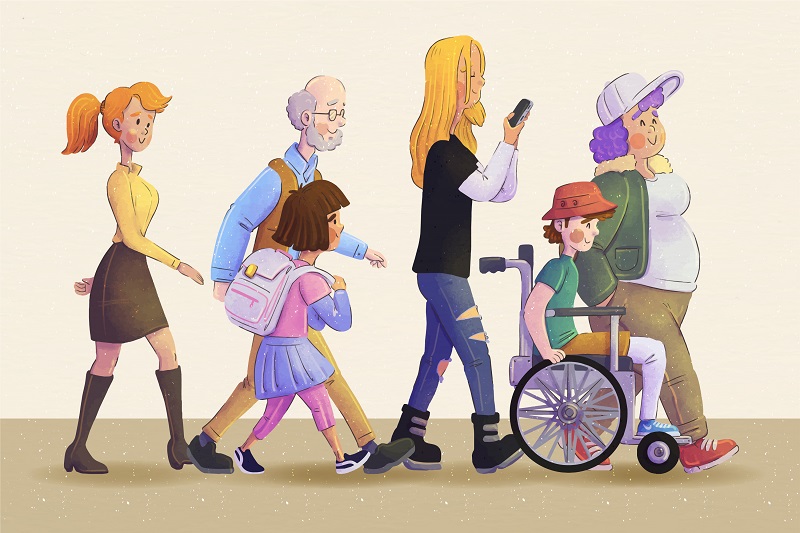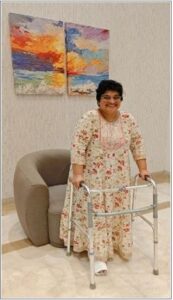
Invisible Disability and Intersectionality – Part 2
In Part 1, I talked about my freak road accident that led to a complex surgery and resulted in a few post-op health complications, leading to my invisible disability.
What Helped in my Recuperation?
What helped me keep my head above the water during this tough time are:
- The unequivocal support from my family and friends
 Manuscript edits, publish, and launch of my book, Imperfect Parenting: Honest Stories from Global Parents, on 17th November 2023, which was a less than three weeks of delay from the estimated launch date when we began in 2022.
Manuscript edits, publish, and launch of my book, Imperfect Parenting: Honest Stories from Global Parents, on 17th November 2023, which was a less than three weeks of delay from the estimated launch date when we began in 2022.- The role of student of C22 batch M.Sc Counselling Psychology in University of Madras IDE (2022-2024) securing First class. “Crisis and Trauma Counselling” paper score was above 80%, categorised as outstanding performance, all thanks to my life experiences and my bio & social background on behaviour, enhancing my knowledge on this domain.
- Anticipation to attend the 25th reunion of my BITS, Pilani batch (1997) in person and my active involvement in the Yearbook compilation, as a volunteer. I successfully travelled and attended this Reunion in Dec 2023 in in Pilani, Rajasthan spending time with friends in the place that was home for 4 years of my early adult life.
Intersectionality & Mental Health Prioritisation
Intersectionality (a key concept in DEI) brings multiple layers and sets the context of an overt behaviour. The personal (& professional) experiences that I have had the opportunity to learn from in the last 2+ decades of my life, have changed the definition of workplace for me. It now includes all kinds of individuals, and not just the traditional working people and their spaces.
For the sandwich generation, home also is a workplace. For Stay-at-home-mom (SAHM) the workplace is home, and the relatives and family members constitute their work force structure (& hierarchy). The workplace culture here differs from the corporate workplace, in the aspect that there are relationships entwined with  emotions, feelings, and sense of entitlement that is difficult to separate from the individuals in this workspace, the gender differences in roles and responsibility is more implicit and hence unrecognisable, until a conscious effort is made. This creates a lot more complexity when prioritisation of mental health is the focus. It needs a mindset shift starting from the aspect of looking at this space as a workplace, and then re-working on traditional value systems and role definitions, responsibility & load sharing and more.
emotions, feelings, and sense of entitlement that is difficult to separate from the individuals in this workspace, the gender differences in roles and responsibility is more implicit and hence unrecognisable, until a conscious effort is made. This creates a lot more complexity when prioritisation of mental health is the focus. It needs a mindset shift starting from the aspect of looking at this space as a workplace, and then re-working on traditional value systems and role definitions, responsibility & load sharing and more.
I am sharing my recovery & rehabilitation journey to highlight these layers that unravel in my non-traditional role. What I have shared gives a mere glimpse into the complexity of this space and the impact role definition can have on it. I can neither define myself as a traditional SAHM, nor as a traditional working woman (outside home). I was and continue to be a primary care giver to the aged in my family during my recovery, apart from my other roles (student, volunteer etc).
Another layer of intersectionality is also disability and its definition. When we hear the word disability, we associate it to physical disabilities that are easily noticed and hence recognised for what it is, irrespective of whether this visualisation helps in aiding the aspect of creating inclusive spaces for them. I currently have a hidden disability that is acquired, which by clinical categorisation might not be classified under disability (PwD Act 2016) at all, and hence is deemed non-existent. Yet for me and my family this is very real, hence an invisible disability as far as the rest of the world.
Intersectionality requires us to see all this and more when we cater to the needs of individuals and groups. It is time that we understood the importance of intersectionality in the DEI and in mental health, in fact in holistic wellbeing too. As individuals and mental health professionals, it is absolutely essential to look at wellbeing from a holistic perspective, even if we personally are inclined towards a specific school of thought. I hope by sharing my personal journey, I have sowed the seeds of change for a holistic perspective while planning treatment interventions for clients in need.

Aarthi Prabhakaran
AM314
